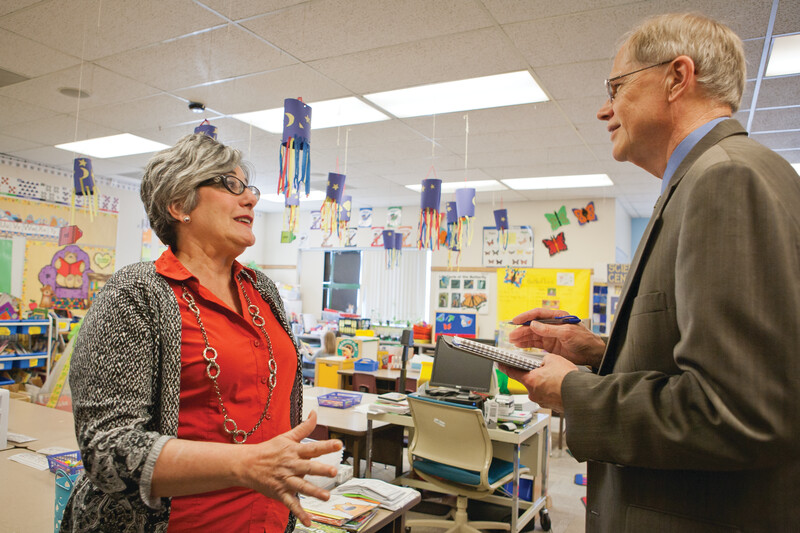A 30-year soak in the pool of public education prompts one experienced fish to reflect on those who swim and on those who watch from the riverbank. Foolish myths about educators elicit our fury, but we sadder but wiser ones learn to see their humor.
Myth #1: Secondary Teachers and Principals Are Smarter
Elementary educators sport silly jewelry and have sticky handprints. Elementary principals are televised on slow news nights. They're the ones kissing pigs or dancing on rooftops. Do tacky attire and crazy stunts indicate inferior intelligence, or do they instead suggest some mysterious form of creativity?
Middle school teachers have an “extra” nonteaching block of time in their schedule. Consider the characteristics of a middle school student. Imagine spending seven-hour days with human youngsters not yet ready to be embraced by general society. Could it be that the middle school teachers spend that extra planning time in group therapy or chilling out on Prozac?
So are high school teachers smarter? While enjoying a 7 a.m. coffee, reflect on the intelligence of the elite content-area specialists, already in their classrooms, attempting to engage students whose brains kick in no earlier than 9 or 10 a.m.
Myth #2: Anyone Can Teach
This is an edited version of “Those who can, do. Those who can't, teach.” State departments of education believe this one! Hence, the “provisional teaching license.” These courageous “provisional” travelers left industry and were willingly transported to the most physically and emotionally demanding work they have ever attempted. Hats off to those who survive, but also to those who turn in their school spirit and abandon their second careers. The latter spread the message, “Now I understand how hard teachers work!”
Myth #3: Teachers Work 8 to 3:30, Nine Months a Year
Does anyone still believe this? Question the spouses of educators—the spouses of those who stayed and the spouses of those who left. Next, collect data from chiropractors, podiatrists, urologists, physical therapists, stress management clinicians, and psychologists. Finally, interview the “provisional” teachers discussed in the second foolish myth.
Myth #4: Educators Have No Voice
Politicians, legislators, and bureaucrats make the decisions, and we, the educators, save the students in spite of the noneducational decisions. This myth stirs the most furious response of all. Wake up, educators! We, who number 2.9 million, are a powerful voice! Double your number and increase your voice by joining forces with secretaries, custodians, cafeteria workers, bus drivers, and support staff. Enlist the PTA, 6.5 million members strong.
Pogo reminds us, “We have met the enemy and he is us.” If we want increased prestige, professional respect, and higher salaries, why not abandon the foolish myths and work together?
Support Your Local Swimmers
Kindergarten teachers and school secretaries are as important to students' success as are high school physics teachers and central-office directors. This is not a myth! Is any educator more valuable than the guidance counselor who comforts a frightened transfer student or the coach who encourages his quarterback to finish high school? The drama teacher who directs a two-curtain-call performance and the special educator who cheers for her students at the swim meet change students' lives and futures. Let's stop arguing about whose task is most difficult and start valuing the work we all do.
Earn Respect
Strive for flawless oral and written communication. Sarcasm, grammar mistakes, and misspelled words send the wrong message to the public. Hold high expectations for colleagues as well as for students. Everyone can benefit from help and support, but covering up for a worker who lacks professionalism decreases respect for all educators.
Select Important Battles
Whining tires the swimmers and annoys the fish. Embrace the standards and accept change. Why shouldn't we want our students to master a body of basic knowledge? We are the ones who make the lessons fun and relevant. The world changes at an increasing rate. Fight battles that focus on what's best for students. All educators can defend manageable class sizes, assistance for the inclusion of students with special needs, and fairly compensated, certified teachers.
Turn your fury about myths into dynamic passion. Impress the nonswimmers with confidence, intelligence, and skill. Learn from mistakes, laugh with friends, and practice self-forgiveness.



